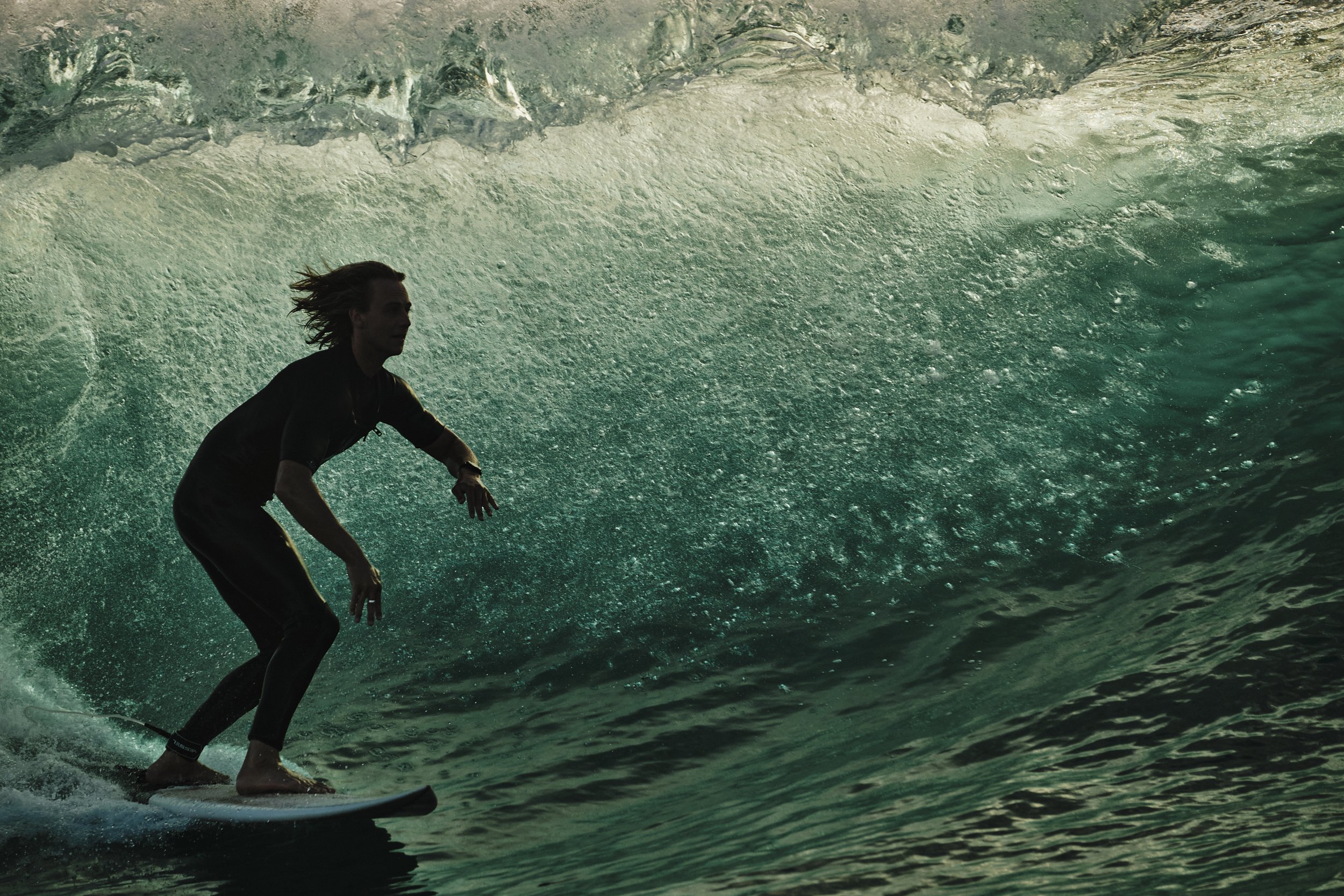Dissecting the surfing bug
Dissecting the surfing bug - by Kalani Ord - Photos by Russell Ord of the author!
The surfing bug can be a cruel and insidious condition. Many ambitions have been stifled, relationships strained and plans transgressed on the premise of needing a surf. Infection periods on the surface fain innocence but underneath the slow and methodical exposure is just waiting to strike! Before you know it, your autumn endeavours are gone, and three months of your life have passed by in a shroud of whitewash. How can this be? well, surfing utilises the same dopamine circuitry that the casino uses to keep you gambling or that elusive partner employs to seem so desirable.
But what is dopamine? Dopamine is a neuromodulator, meaning it influences the communication of many neurons including adrenaline, and noradrenaline. You can think about dopamine as the Bruce Buffer (UFC official octagon announcer) of the body, as when IT'S TIME!, it can massively excite, cultivate, and facilitate neurological circuits responsible for mediating energy, mindset, and efficacy. To simplify, dopamine has everything to do with how you are feeling now, how you will feel an hour from now and your levels of motivation, desire, effort, craving, time perception, and mood.
You may have heard someone say "I need to get a hit of dopamine". However, that is a largely imprecise expression as the pleasurableness of an event does not just rely on the peak of dopamine. It's contingent on the peak level relative to the baseline level of dopamine. So, if you do something (or take something) that leads to a massive increase in dopamine, your preceding baseline levels of dopamine will drop proportionately to how high the peak was, as dopamine production is finite and there are insufficient levels of dopamine around to maintain your baseline.
Now in the context of surfing, we can easily tell that people have varying baseline levels of dopamine or put more colloquially, varying "froth levels". From experience, cosmopolitan exuberance is highly unsavoury during the holidays and long weekends, but can you blame them, 4ft with 15 people would feel like Disneyland in comparison to 1ft slop with 50 people. Thankfully as we have established, the dopamine psych-juice is finite. In time, the metro manic will subside and froth levels will find a more respectable equilibrium.
Now to get more technical and ask why casinos keep you gambling? elusive partners keep you enthralled? and surfing, well, keep you surfing? The answer lies in the shared neurological circuitry. Specifically, referred to as intermittent dopamine reinforcement schedules which is just a fancy way to say that dopamine is randomly released in varying amounts. You don't know when a 4-leg multi will pull-through, if that elusive partner will message, or when you will get a wave (subjectively scored) in the excellent range. Surfing (like gambling) is one of those activities that has an intermittent dopamine reinforcement schedule woven into it. Sometimes the onshore comes in as soon as you paddle out, sometimes you land something sick when the waves suck and sometimes you get multiple barrels in a session and don't get vision for months thereafter. In surfing, you don't have a specific schedule of when you will be psyched. We can have forgettable sessions when it is pumping, and we can enjoy an onshore close-out and it's this unpredictability that has elevated surfing into a global pandemic.
To deviate abruptly on a tagine, when defining dopamine, I claimed that it affects our time perception. I never gave much thought to this phenomenon until I looked back on some footage from a recent session. What I thought to be a decent barrel was little more than a head-dip. How could this be? It turns out my system was 'over-clocking' which refers to when dopamine and adrenaline increase so profoundly that our level of alertness skyrockets spiking our perceptual framerate resulting in an ultra slow-motion sensation. Now when that over-clocked memory got uploaded into my memory system it was stamped down with a longer duration due to my distorted sense of time. For example, if your system is over-clocking, the reality of time in the barrel might be "1..2..." yet it gets encoded as "1…. and…., 2…., and….", leading to an indelible sense of discomfort when viewing the head-dip in the place of the 3-second barrel.
Now for some action points to maximise your surfing experience. Scientists give cautionary warnings advising not to use stimulants every time you work, workout, or do anything you would like to continue at. Thankfully, surfing limits your exposure to food, your phone, and other exogenous dopamine-releasing stimulants. There is (generally) no music, no social media, and no sweeties artificially boosting your mood and distracting you from the pleasureful sense of being in the water. When you surf, you are entirely concentrated on surfing and scientifically, that is the best way to do it. However, coffee is one stimulant that the researchers endorse. Not only does coffee improve your digestive tract, but it increases the density and efficacy of your g-protein-coupled receptors, so upon completion of a textbook wrap the dopamine realised will be better synthesised by your system leading to greater enjoyment, pleasure, and overall contentment.
To summarise, you don't want dopamine levels too high or too low it's all about staying in that goldilocks range, and thanks to its inherently random dopamine scheduling and its unpredictability, surfing will continue to eviscerate ambitions, strain relationships, and torment timetables.
References
Huberman, A. (Host). (2021-present). Huberman Lab [Audio Podcast]. https://hubermanlab.com/. https://hubermanlab.com/science-of-social-bonding-in-family-friendship-and-romantic-love/
Ihsan, M., Watson, G., & Abbiss, C. R. (2016). What are the physiological mechanisms for post-exercise cold water immersion in the recovery from prolonged endurance and intermittent exercise?. Sports Medicine, 46(8), 1095-1109.
Soares, S., Atallah, B. V., & Paton, J. J. (2016). Midbrain dopamine neurons control judgment of time. Science, 354(6317), 1273-1277.




